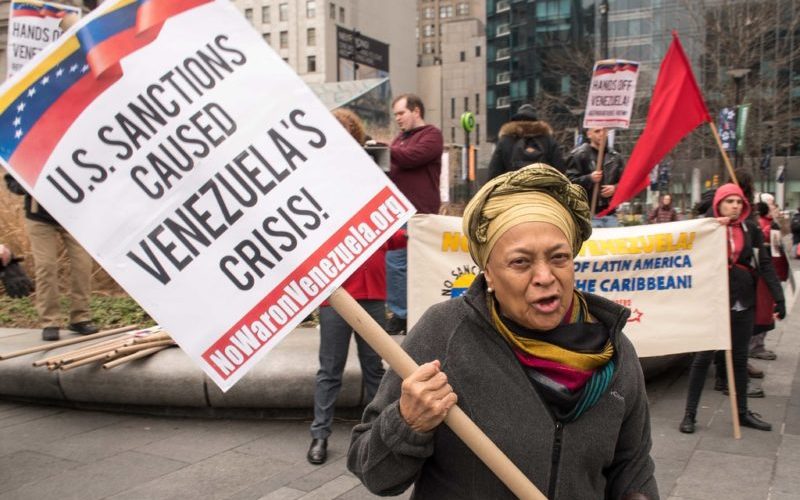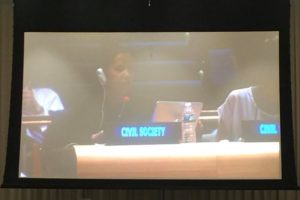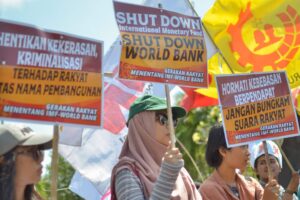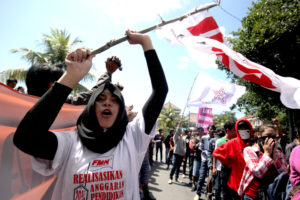Ending the unilateral sanctions and aggressive US policies against Venezuela are necessary conditions to realise their economic, social, and cultural rights. Solidarity of people’s organisations, social movements, and civil society are key towards amplifying the Venezuelan people’s calls against sanctions.
As the global pandemic pushes the world deeper into an economic fallout even more severe than the financial crisis in 2008, United States (US)-backed international financial institutions (IFIs) have taken more of an active role in salvaging the global economy at the expense of developing countries. After driving the neoliberal framework that further drained the resources from the global South, the International Monetary Fund and the World Bank Group are now pushing poorer countries closer to debt crisis by offering “financial assistance” through loans[1][2][3] that are projected to force austerity on the people.[4] Countries in the Latin American region are already suffering from such crises[5] amid rising COVID-19 cases.[6]
Latin American countries have been deeply marred by US “field experiments” through the global power’s regional policies. Aside from historically backing military dictators and a number of military coups, the US has been advancing neoliberal policies in the region since the 1970s. These shaped states’ roles towards enabling big private sector for the benefit of US multinationals and finance capital.[7] These interventions are the reasons why many Latin American countries, like elsewhere in the global South, have historically faced debt crises and issues in social services even before the pandemic.
Today, aside from Bolivia and Cuba, another country continues to earn its attention due the fact that it has the world’s largest oil reserves: Venezuela. With US sanctions placed still active even amid the global pandemic, Venezuela is faring way worse than its Latin American neighbors, and prospects for the people’s right to development in the country are blocked.
| Timeline: Oil and US economic interests in Venezuela |
|---|
|
1895 – During a territorial dispute between Venezuela and Britain, the US established itself as “global police,” invoking the Monroe Doctrine that treated the Latin American region a “backyard” of US intervention as it prohibited European powers.[8] 1908 – The US, through its Navy, helped former Venezuelan Vice President and general Juan Vicente Gómez to seize control of the country in a coup.[9] Gómez granted profitable concessions to oil companies such as US-based Standard Oil and British-Dutch Royal Dutch Shell.[10] 1922[11] – More than one hundred foreign companies have scrambled and acquired vast amounts of lands in hopes of having struck “black gold.”[12] This rapid development of the oil industry and reliance on natural resource exports has since tied its economy to the whims of the global oil market.[13] 1970s – The world’s oil industry was shaped by economic crisis and overproduction. It was followed by declining prices for crude oil in the next decade.[14] This forced the Organization of the Petroleum Exporting Countries, in which Venezuela is a member, to decrease its production of petroleum in order to maintain oil prices. As an oil exporter, the crisis left a huge impact on Venezuela’s economy. In addition to the soaring inflation rate,[15]the state also accumulated massive foreign debts from IFIs and purchased oil refineries abroad. 1989 – Carlos Andrés Pérez was re-elected. Under his second term, and as part of a financial bailout by the US-led IMF, the Venezuelan government launched a fiscal austerity package and a series of neoliberal policies. People responded with massive protest actions that came to be known as the Caracazo, after the country’s capital.[16] Early 2000s–Post-9/11 US militarism and the rise of China have again boosted the demand on oil.[17] With increasing prices, the US led shale oil extraction—an expensive method of extracting synthetic crude oil,[18] which added 4 million extra barrels to the global market per day in 2010.[19]The US found itself in competition with OPEC countries, amid oil overproduction.[20] 2013 onwards –Nicolas Maduro came into power in 2013, after the death of former President Hugo Chavez who was opposed to US intervention. World oil overproduction has greatly affected Venezuela and its state-owned oil company, the Petróleos de Venezuela, S.A. (PDVSA). Faced the challenge of the plummeting oil prices in 2014, the situation was further compounded by US interventionism and economic sanctions. |
Waves of sanctions under Obama
While unilateral sanctions against Venezuela go as far back as 2005, these expanded significantly under the Obama administration.
In December 2014, the US Congress approved sanctions against the Central Bank of Venezuela and the government-owned oil and natural gas company Petróleos de Venezuela, S.A. (PDVSA). The state oil company generates more than 90% of Venezuela’s state revenues.[21] The US measure, purportedly for “Human Rights and Civil Society in Venezuela,” instead established unilateral measures to block and freeze assets, funds and Venezuelan properties, along with targeted suspension of entry, the cancellation of visas and other documentation belonging to individual Venezuelan officials.
In 2015, President Barack Obama designated Venezuela as an “unusual and extraordinary threat to the U.S. National Security.”[22] From 2015 to mid-2017, the US revoked officials’ visas and froze their assets. At the same time, foreign financial institutions—under pressure from the US Treasury Department—closed the accounts of their Venezuelan clients and refused to carry out operations for Venezuela.[23] Citibank terminated the service to foreign currency accounts of the Central Bank of Venezuela and other public institutions,[24] and refused to receive money. Citibank prevented a deposit to pay for 300,000 insulin doses which are needed to treat Venezuela’s diabetic patients.[25]
Under Trump: Further chokehold on the economy, democracy, and rights
From mid-2017 to late 2019, more brazen economic sanctions have been issued under President Donald Trump.[26] The sanctions granted legal status to the financial blockades and further entrenched the US embargo to undermine the Venezuelan economy. In August 2017, Trump issued U.S. Executive Order 13808 which prohibited direct or indirect purchases of Venezuelan government banknotes, bonds,and common stocks,along with products such as petroleum from the PDVSA.[27] It further confiscated PDVSA’s US subsidiary, CITGO Petroleum, worth USD 8 billion.[28] This resulted in a staggering loss for the Latin American country, with estimated losses of USD 6 billion compared to a year before the sanctions.[29]
The US embargo on Venezuela has also resulted in a range of attacks on people’s economic and social rights that had not originated from the domino effect of the 2014 oil crisis. Treatments for malaria, cancer, HIV, and other illnesses have failed to reach more than 300,000 Venezuelans who are at risk due to the sanctions and blockades.[30] Imports for the country’s manufacturing industry and public infrastructures for housing and water were left stagnant due to the lack of materials.[31] Food distribution was also heavily affected. In September 2017, 18 million packages were left undistributed across the country because payments for the distribution of food relief have been blocked by foreign banks.[32]
As if the economically devastating embargo was not enough, the US even tried to meddle with Venezuela’s 2018 presidential elections by threatening a military coup against Maduro.[33] Trump signed Executive Order 13857 recognizing Juan Guaidó as an interim president of Venezuela,[34] and has utilised USAID and its humanitarian programmes to “(1) support Guaidó’s legitimacy as the Interim President of Venezuela and (2) increase pressure on Maduro to step down as president.” [35]
The UN Special Rapporteur on unilateral coercive measures and human rights has called for an end to US sanctions against Venezuela. She cited the impacts on “all categories of human rights, including the rights to life, to food, to health and to development.”
Preventing adequate response to the pandemic
The US embargo is still in effect today under President Joe Biden. At most, the administration instituted a waiver of the sanctions specifically for the oil company Chevron, licensing its presence in the Latin American country.[36]
Like his predecessor, Biden is continuing the sanctions even amid the COVID-19 pandemic.[37] Venezuela currently has more than 265,000 cases and over 3,000 deaths.[38] The barriers to Venezuela’s financial transactions prevent the country from accessing COVID-19 vaccines under the COVAX programme.[39] The US measures compromise the people’s right to health, despite US pretexts that sanctions respond to rights issues. In the bigger picture, the economic sanctions also hamper the global fight against COVID-19.[40]
Ending sanctions against Venezuela, for people’s development
Amid Venezuela’s barriers to accessing COVID-19 vaccines, Cuba provided help. The first shipment of the 12 million doses of COVID-19 vaccines has arrived in Venezuela by late-June 2021.[41]
In the case of the US embargo against Cuba, hundreds of countries have already voiced their opposition.[42] In the case of Venezuela, the UN Special Rapporteur on unilateral coercive measures and human rights has called for an end to the sanctions. She cited the impacts on “all categories of human rights, including the rights to life, to food, to health and to development.” She instead stressed that sanctioning countries should “observe principles and norms of international law.”
Ending the unilateral sanctions and aggressive US policies against Venezuela are necessary conditions to realise their economic, social, and cultural rights. Essential would be the right to development that is felt and owned by the toiling sectors. Much more needs to be done. Solidarity of people’s organisations, social movements, and civil society are key towards these objectives. For instance, the International League of Peoples’ Struggle had taken on a months-long solidarity campaign with the Venezuelan people against US aggression.
In 1989, the Venezuelan people showed their resistance to the measures imposed by the US-led IMF and the Perez government during the 1989 Caracazo protests.[43] It is in this same spirit of exercising people’s sovereignty today, defending their sovereignty from subjection to the interests of global powers, could the Venezuelan people assert their right to shape their development paths.#
[1] https://www.wsj.com/articles/imf-world-bank-face-deluge-of-aid-requests-from-developing-world-11586424609
[2] https://www.worldbank.org/en/news/press-release/2020/10/13/world-bank-approves-12-billion-for-covid-19-vaccines
[3] https://www.cnbc.com/2021/05/21/imf-urges-50-billion-spending-commitment-to-help-end-pandemic.html
[4] https://www.oxfam.org/en/press-releases/imf-paves-way-new-era-austerity-post-covid-19
[5] https://www.oecd.org/coronavirus/policy-responses/covid-19-in-latin-america-and-the-caribbean-an-overview-of-government-responses-to-the-crisis-0a2dee41/
[6] https://www.npr.org/2021/06/01/1001995873/vaccinated-americans-get-back-to-bbqs-but-covid-19-still-ravages-latin-america
[7] https://cepr.net/is-latin-america-still-the-us-s-backyard/
[8] https://besacenter.org/monroe-doctrine-venezuela/
[9] https://www.ozy.com/true-and-stories/meet-venezuelas-original-oil-gangster/85309/
[10] https://uwspace.uwaterloo.ca/bitstream/handle/10012/11823/RosalesNieves_Antulio.pdf?sequence=3
[11] https://www.ogj.com/general-interest/companies/article/17216507/a-modern-look-at-the-petroleum-geology-of-the-maracaibo-basin-venezuela
[12] https://www.cfr.org/backgrounder/venezuela-crisis
[13] https://santandertrade.com/en/portal/analyse-markets/venezuela/economic-outline#:~:text=The%20main%20industrial%20activities%20revolve,aluminium%20and%20engine%20parts%20assembly.
[14] http://www.self.gutenberg.org/articles/eng/1980s_oil_glut
[15] https://www.econstor.eu/bitstream/10419/171264/1/1004712634.pdf
[16] https://orb.binghamton.edu/cgi/viewcontent.cgi?article=1102&context=dissertation_and_theses
[17] https://www.lgt.com/en/magnet/financial-markets/long-term-investment-trends-the-crude-oil-boom-in-the-2000s/#button2
[18] https://oilandenergyonline.com/articles/all/shale-oil-makes-rebound/
[19] https://www.economist.com/leaders/2014/12/04/sheikhs-v-shale
[20] https://www.wsj.com/articles/opec-unlikely-to-cut-production-says-kuwaiti-minister-1413127322
[21] https://home.treasury.gov/system/files/126/venezuela_publ_113_278.pdf
[22] https://money.cnn.com/2015/03/09/news/economy/united-states-sanctions-venezuela/index.html
[23] https://www.celag.org/economic-consequences-boycott-against-venezuela/
[24] https://www.reuters.com/article/us-venezuela-citibank-idUSKCN0ZS17X
[25] https://venezuelanalysis.com/analysis/14111
[26] https://fas.org/sgp/crs/row/IF10715.pdf
[27] https://www.cnbc.com/2019/01/28/treasury-set-to-sanction-venezuela-state-owned-oil-firm-sen-rubio.html
[28] https://masspeaceaction.org/us-sanctions-and-venezuelas-economy/
[29] https://usrepresented.com/2019/05/20/american-imperialism-in-venezuela/
[30] https://cepr.net/images/stories/reports/venezuela-sanctions-2019-04.pdf
[31] https://www.dw.com/en/the-human-cost-of-the-us-sanctions-on-venezuela/a-50647399
[32] https://www.alainet.org/en/articulo/200568
[33] https://www.npr.org/2019/02/22/696057482/trumps-venezuela-moves-follow-long-history-of-intervention-in-latin-america
[34] https://www.businessinsider.com/juan-guaido-venezuela-opposition-leader-sworn-in-as-interim-president-nicolas-maduro-protests-2019-1
[35] https://oig.usaid.gov/sites/default/files/2021-04/9-000-21-005-P_0.pdf
[36] https://www.argusmedia.com/en/news/2220493-us-extends-chevron-waiver-for-venezuela-update
[37] https://www.worldoil.com/news/2021/6/21/biden-rejects-maduro-s-call-for-the-us-to-end-venezuela-sanctions
[38] https://www.worldometers.info/coronavirus/country/venezuela/
[39]https://www.commondreams.org/news/2021/06/11/crime-venezuela-says-us-sanctions-disrupting-payments-vaccine-sharing-facility
[40] https://theintercept.com/2021/06/18/covid-vaccine-cuba-venezuela-sanctions/
[41] https://www.aa.com.tr/en/latest-on-coronavirus-outbreak/venezuela-receives-first-shipment-of-cuban-coronavirus-vaccine/2284620
[42] https://news.un.org/en/story/2021/06/1094612




